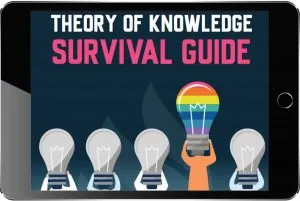Pt. 3 – Knowledge questions and knowledge claims
(or how I mastered IB ToK achieving the best grade – and how you can too!!!)
Knowledge questions and knowledge claims are super central to ToK, in fact, the subject is based on them! In this section we’re going to learn what they are. Then we’ll think about some examples and how they might come up in your presentations and essays.
Knowledge questions
Knowledge questions are so important to ToK that the syllabus says ‘an essay or presentation that does not identify and treat a knowledge question has missed the point’. We certainly don’t want to miss the point so it’s essential that you can identify a knowledge question when you see one.
There is a question you might have heard of before in ToK: ‘how do we know what we know?’. This is an example of a knowledge question. All knowledge questions ask about how we know things. There are really an unlimited number of these kinds of questions, here are 3 more specific examples.
Let’s look at 3 examples of knowledge questions:
• What counts as evidence for a scientific theory?
• What makes a good explanation in philosophy?
• Do we know whether it is right to coerce other people?
Each of these questions contains a key word which gives us a big clue that it is a knowledge question. Look at the questions and try to guess which word is critical to each one now. Which words did you pick out?
The first questions asks us what counts as evidence. It wants us to show a standard of what counts proof for a piece of knowledge.
The second question asks about what is a good explanation. A good explanation would support us if we claimed to know something.
The third question asks us about whether something is right. It invites us to try and show the method we used to make a claim that something was right.
Read the three characteristics of a knowledge question below, then come back and look at the examples. It should be clear that they are indeed knowledge questions.
Click the picture above to access our free TOK Survival Guide!
Knowledge questions – 3 characteristics
1. Knowledge questions are about knowledge (duh!). But they are not questions of what you know. ‘Which is the third planet from the sun?’ is not a knowledge question. It only asks for a piece of knowledge. Instead a knowledge question asks how a piece of knowledge is produced – the ‘methods and mechanisms’ for producing knowledge. A good place to start when thinking about this is the Ways of Knowing – which we will discuss in the next blog post.
2. Knowledge questions are open. They don’t have one right answer but rather there are multiple answers and different sides to the argument.
3. Knowledge questions are general. They are not specific to a single example. You must use your judgement for this. There is a scale that goes from asking ‘what is the weight of my pen’ to ‘how do we know what reality is like’. The former question is very specific and therefore would not make a good knowledge question. The latter is too general and would not be good for you to try and tackle in your coursework. One guiding rule is that knowledge questions should not use vocabulary specific to any subject. Anyone should be able to understand all the words in a knowledge question!
Next time you want to identify a knowledge question, look at these three characteristics and check that it fulfils them all.
Knowledge claims
Basically these are claims or statements saying that we think we know something:
1. Some claims are made by individuals, or communities, about how the world and how it works these are called first order knowledge claims. ‘Mammals cannot fly’ is a first order knowledge claim. The claim does not have to be true (think bats), but it does have to say something about the world.
2. Some claims are made about knowledge itself, for example ‘mathematical knowledge is always certain’. This is what is called a second order claim as it examines knowledge itself. We are seeking knowledge about knowledge!
Hopefully you now feel a bit happier with what knowledge questions are. You should be able to use your new skills to identify and even come up with new knowledge questions. You should also have a good idea what a knowledge claim is, that there are two types of knowledge claims and what those are. If you’ve been following the guide so far you’re well on the way to becoming a ToK master.
Come back next time to learn about Areas of Knowledge and continue your journey toward ToK success!
Read Part 4: The Ways of Knowing – Language, Senses, Emotion and Reason



